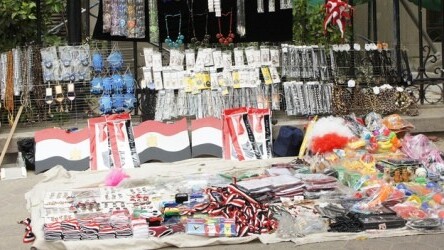
It was bound to happen. The Egyptian uprising quickly turned into an opportunity to make a quick buck. There have been t-shirts, jewelry, bumper stickers, flags, and even patriotic songs turned into downloadable ringtones – which you must pay for, of course. The latest money-making effort to hit the online scene is possibly the most misguided of them all, and it has been met with harsh criticism.
A $1.99 iOS game, simply entitled Egyptian Revolution (Jan 25), gives users the chance to take on the role of an Egyptian protester, or that of a riot policeman. As a protester, you have to dodge teargas and bullets, while as a policeman you must defend yourself using what the game describes as “the protesters own weapons against them.” The game also uses iconic images from the uprising that have been seen all over the media.

Egyptian Revolution (Jan 25) appears to be a minefield of mishaps, including politically incorrect, cringe-worthy and often inaccurate scenes. The game implies that protesters were violent, and even worse, trivializes a very serious matter.
It can’t be denied that the world of gaming is no stranger to controversy. There’s also no denying that historical events are often used to formulate a storyline. That said, the Egyptian uprising, and the deaths it left in its wake, are still very fresh in people’s minds, and it’s still ongoing. Reducing these events into an iOS game has not gone down well.

Egyptian developer Ahmed Nabarawy, a 24 year old medical intern, told Emaj Magazine that he was concerned the game might cause some controversy. Despite his concerns, Nabarawy submitted the game anyway. While Apple took longer than usual to review the game, it was approved. After consultations with its legal department, Apple came to the conclusion that no one would be insulted by the game’s release.
It seems both Apple and Nabarawy missed the mark on this one. Cairo-based website Bikya Masr quotes Egyptian students who call the game “disrespectful,” and one even goes so far as to say that the developer should be sued, or incarcerated.
Following the controversy, Nabarawy was quick to add a disclaimer to the game’s description, saying that it “does not encourage violence,” and “is not meant to insult or make fun of anyone.” The disclaimer continues: “The developer of this game doesn’t have any hate or disapproval of any current government, he is just documenting what happened.”
Despite the backlash, the game has received 82 ratings, with an average of 4 and a half stars.
What do you think of the game? Harmless fun or unavoidably offensive? Let us know in the comments.
Get the TNW newsletter
Get the most important tech news in your inbox each week.





